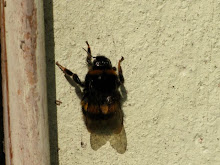 Last night the BBC devoted a hourly long TV programme on the plight of the honey bees - five people called me to tell me to watch it! Big thanks. It covers the whole range of problems facing honey bees: CCD, commercial beekeeping, stress, mono-crop, chemical poisoning...
Last night the BBC devoted a hourly long TV programme on the plight of the honey bees - five people called me to tell me to watch it! Big thanks. It covers the whole range of problems facing honey bees: CCD, commercial beekeeping, stress, mono-crop, chemical poisoning... It was interesting (and disturbing) to see how commercial operations works. This is beekeeping - if you can call it that - as industrial production. It's a pity that the programme didn't spend more time examining the stress factor cause by these operations. Although everyone agrees that trucking millions of bees across vast distance to pollinate crops "can't be good" for them. In order to solve problem of CCD in the US they fly bee packages from Australia!
It was also interesting to learn that urban bees has less of a problem ( chemical poisoning, and mono-crop) in comparison with bees in the country side. It seemed to suggest that urban beekeepers are less affected by CCD. Is this true? There was no mentioning of Top bar/ natural beekeeping, which is a bad omission.
Although we don't know exactly is killing the bees, we do know what the problems are - so what is the solution to arrest the decline? To me the best answer came from one contributor just so happen his bees are not far from where I live in London). He said people should be encouraged to keep a few hives of bees locally. I agree with this totally. This is one of the main reasons I have bees. If, say, 20 percent of a local population keep just a few hives surely that would help to solve the local pollination problem. We can still have commercial bees, but at a much reduced and localised scale. 'Small' as they say 'is beautiful'.

Bee dialogue is very interesting. I have 2 different friends running between 40 and 50 hives each. One is very organic, like me, and uses no chemical to treat. She typically loses 2 hives a year. The other is an old-timer with about the same number of hives. He treats with chemicals and also loses about 2 hives a year. They are both comfortable with what they are doing.
ReplyDeleteI hope you have been able to get a copy of Ross Conrad's Natural Beekeeping.
Hi Lynn
ReplyDeleteThat is interesting indeed. Yes, the book seller just informed me that the book has arrived. I shall collect it on Monday. Just read your blog about your success with the swarm you collect. Lovely photos by the way.
I totally agree with your comments, I am a woman urban beekeeper with 2 hives in a large city in NZ and a big advocate for educating the public about the huge need for bees, something that can be done in an urban area. I am running a workshop soon, have given a couple of talks and hopefully will be teaching a 5 week night class for adults in Aug re beekeeping - educate,educate, that`s what I believe in.
ReplyDelete